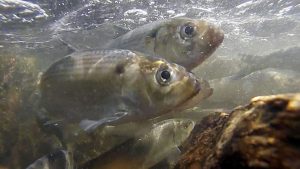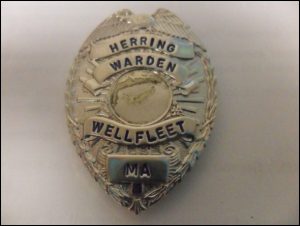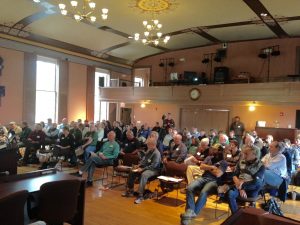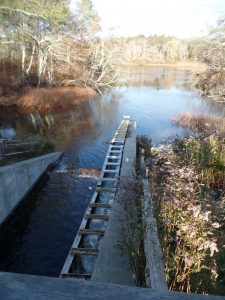Update on River Herring Network
Dec. 2017 -- Each spring river herring come from the ocean and swim, or “run” up rivers to spawn in ponds and slow sections of rivers. Each fall, Massachusetts river herring wardens gather together to talk about their favorite fish and discuss ways to preserve it.

Over the past 300 years, what had been a bountiful harvest declined for many reasons including dam construction and poor water quality, but in the late 20th century, herring populations sharply declined to as little as one percent of their historic size.
In 2006, in response to the dramatic drop in herring numbers across the state, the Mass. Division of Marine Fisheries placed a moratorium on harvest.
Harvest Isn’t Everything

Without a harvest to monitor, the position of town herring warden might have been eliminated, but it wasn’t. In 2010 a group of herring wardens and watershed organizations got together to learn more about why the herring numbers were dropping, and what actions they could take to reverse the decline. They also thought it would be useful to talk with wardens in other towns and compare notes on what was happening in different rivers. In 2011 this group called themselves “The River Herring Network” and applied for grant funding from the Mass Bays program to get organized, hold regular meetings, and communicate with each other. In 2013 Woods Hole Sea Grant got involved supporting Extension Agent Abigail Archer who provides helps organize annual meetings and keeps communication flowing year-round.

A representative from Mass. Marine Fisheries provided an update on management practices and an overview of herring population numbers in Massachusetts and the New England region. The group was told that, though there were some positive signs, their data indicate that river-herring population was still depleted to near historic lows.

The group is still working to understand all the causes of the depletion of river herring. The moratorium on river herring harvest has been renewed every few years and is still in place in 2017.
The powerpoint presentations from the meeting are available on the River Herring Network website.
Video of the meeting can be accessed on the Pembroke Town News YouTube channel.
Interview with Extension Agent Abigail Archer
The 2015 River Herring Network annual meeting was held in Pembroke, Mass. Before the meeting, Woods Hole Sea Grant Marine Resource Specialist Abigail Archer gave Pembroke Community TV a great overview of the River Herring Network’s activities. If you want a quick explainer on what the River Herring Network is all about, check out Abigail’s interview on YouTube.
Voices from the Fisheries
NOAA’s Voices from the Fisheries Database is a central repository for consolidating, archiving, and disseminating oral history interviews related to commercial, recreational, and subsistence fishing in the United States and its territories. You can search the site in various ways and find interviews with members of the southeastern Massachusetts shellfish industry and local river herring wardens, who were interviewed by Woods Hole Sea Grant and Cape Cod Cooperative Extension marine resource specialist Abigail Archer.
